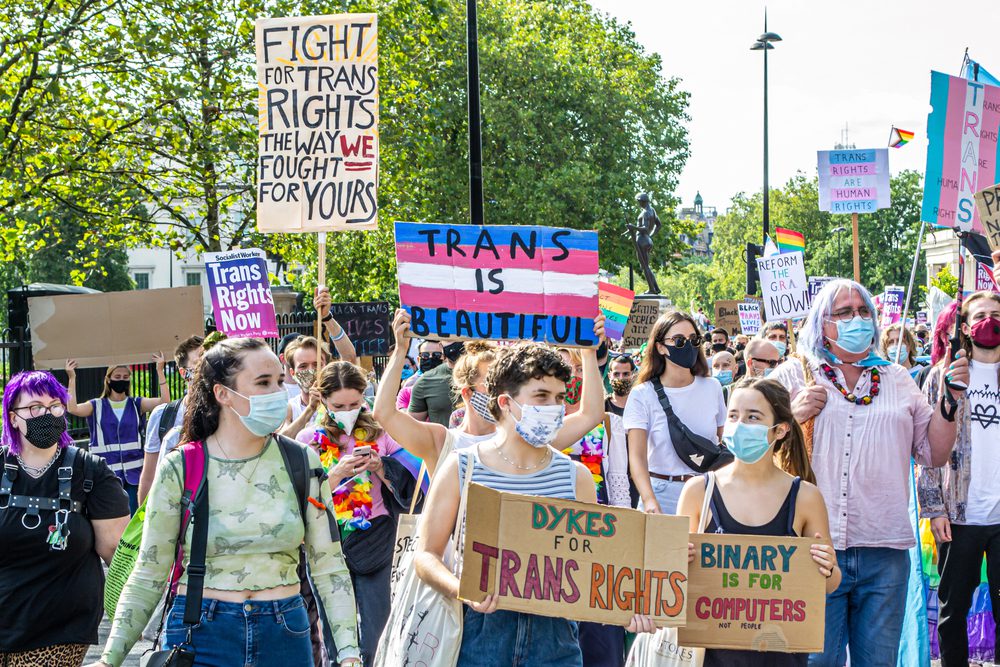The Supreme Court’s judgment in For Women Scotland v The Scottish Government has triggered significant concern across trans communities and among organisations working to uphold inclusive practices across all areas of public, private, and third sectors.
While the ruling focused on a narrow legal question – how the term “sex” is defined under the Equality Act 2010 – it is already having a broader impact. In response, the Equality and Human Rights Commission (EHRC) issued an interim update and launched a public consultation on its statutory Code of Practice.
Over the last decade, the legal uncertainty, heightened media scrutiny, and shifting institutional responses have been combining to create a landscape of deep anxiety for trans communities.
But trans people are not passive in this moment in history, and neither are our cis allies – our friends, family members, and colleagues.
We are working hard to have our voices heard, exercising our democratic rights by talking to our MPs and other parliamentarians, engaging with public sector services and the systems of service user voice – raising the issues and telling our stories.
So much of this is about humanising who we are as trans folk and myth-busting around the demonisation and stereotyping that is reinforced by mainstream media and some individuals who are in positions of leadership.
At Gendered Intelligence, we’ve also been working with organisations across all sectors to support them to communicate their commitments to inclusion – especially through two recent resources: Our EHRC Consultation Response Guide and Maximising Trans Inclusion Guide.
From these tools, and our ongoing engagement with trans communities, three core priorities emerge: maintaining inclusive practice, ensuring dignity in everyday life, and ensuring trans voices are heard.
Trans-inclusive Practice Must be Defended
Our primary concern is that the EHRC’s proposed changes will lead to more exclusionary policies being introduced – not because the law demands it, but because public bodies feel uncertain, cautious, or under pressure from litigation.
For instance, the Supreme Court ruling confirmed that the Equality Act’s protected characteristic of “sex” refers to certificated sex at birth. But crucially, there are legal views out there that stipulate that this does not mean that trans people can or should be excluded from single-sex services.
When organisations are responding to both the Supreme Court Judgment and the EHRC interim update to exclude trans people categorically, this is deeply damaging for trans people, as well as others.
That’s why our Maximising Trans Inclusion Guide sets out how organisations can continue to offer inclusive services within the law.
Many services have been operating effectively with trans-inclusive policies for years, with no untoward incidents. These services do not want to retract these good practices now.
So, we urge all organisations – especially public services – to reaffirm their commitment to trans inclusion.
This means clearly stating your values, reviewing internal guidance with expert support, and ensuring frontline staff are confident in inclusive delivery.
Dignity and Safety in Daily Life are Non-negotiable
Trans people want what everyone else wants from public life: to feel safe and respected and to be treated fairly. But in the wake of this ruling and the consultation that followed, many trans individuals now feel less certain that they will be able to access spaces and services safely.
Every day, trans people navigate decisions that most never have to think twice about. Which GP practice will treat them with respect?
Will they be safe in a leisure centre changing room?
Will a housing provider make assumptions that put them at risk?
These are not theoretical concerns. They shape whether people access services at all.
Our EHRC Consultation Response Guide outlines why the Commission’s proposed changes are likely to undermine the basic dignity and wellbeing of trans service users.
The draft proposals of the Code of Practice offer no support to organisations who want to include trans people whilst being compliant with the Supreme Court Judgement ruling.
Trans People Must be Heard
Too often, decisions that affect trans communities are made in rooms where no trans people are present. We see this across sectors – from healthcare and education to sport and local government.
This exclusion isn’t just disempowering – it leads to policies that don’t work in practice and fail to account for the lived realities of those they’re meant to serve.
Trans people have expertise. They understand what works. Public institutions must do more to engage them meaningfully – not just in consultations, but as partners in co-producing services and shaping policy.
We call on all public bodies to respond to the proposed changes to the Code of Practice – and to actively seek out and amplify trans voices in the process
Final Thought
Trans people’s priorities are clear: To be safe, to be included, and to be heard. We invite all decision-makers to reject fear-based narratives and stand with trans people in building a fairer, more inclusive public life.
Featured image via JessicaGirvan / Shutterstock.


